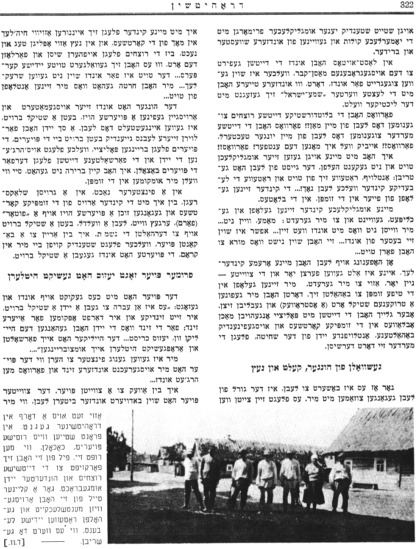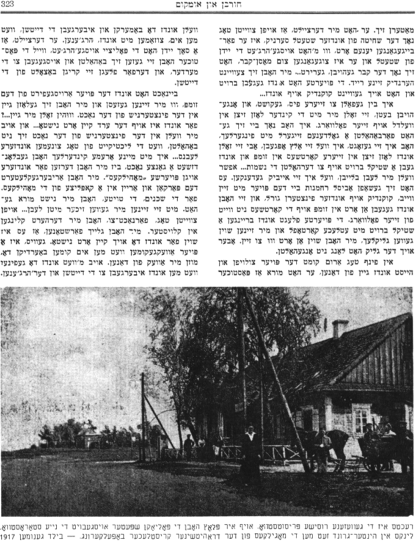
[Page 322]
my eyes that tragic morning with the wailing and crying of our brothers and sisters.
The Germans herded us into trucks for the trip to mass graves that they had prepared for us, and where our loved ones recited their final “Hear O Israel” and left this world. Why did the bloodthirsty German murderers take my husband's life? Why did the German murderers take the life of my younger sister, why? I will always demand an answer! Why?
I saw their tragic deaths with my own eyes, and couldn't help them. The spirit of life pushed me on: Escape, save yourself from death and save the children who are still alive! The children fled from fire into the swamps. My unfortunate children sobbed, cried and said to me, “Mama, don't cry….we don't know what will happen to us. Maybe things are better for us.” They no longer had anything to fear from death.
This is how my poor children, without hope for life – one was fourteen, the other nine – spoke to me. We fled into the deep swamps to hide. We found some dry land (a little island) and sat there. However, the Germans and the police started raiding the swamp areas and whenever they found Jews in hiding after escaping from the massacre, they shot the Jews on the spot.
Swollen from hunger, cold and wetness
Since I was fated to live, that fate accompanied me. There were times when my children and I would sneak around like little animals in the moss, and spent days and nights all wet, until the murderers would stop shooting and leave the area where Jewish bodies were lying around. We no longer feared death, and even regretted having escaped death.
Hunger exhausted us, and when we got out we came across a peasant house, where we begged for a piece of bread, something that was risky. Many Jews lost their lives begging for bread from the peasants. The peasants would call the police, who would kill the Jews, and the accursed Germans would give the peasants money. I had no choice – either way we would die in the swamps.
One dark night, when it was raining very hard, the children and I left the swamps and went to look for a peasant house on a farm, far away near the forest, to ask for some bread to stay alive. I went in to a peasant I knew who always used to by from my store, and she gave us some bread.
Religious peasants said that Jesus had sent Hitler
[photo:] This is how villages looked around Drohitchin. In front are some White Russian peasants, (khokhols as they were called). Many of them sold themselves to the German murderers, and hundreds of Jews were killed. Only a tiny minority of them demonstrated some humanity and helped to save Jewish lives, as described here. (D. W.).
The peasant's husband looked at us angrily and said that it was a sin to give Jews any bread because Jews were sinners and suffer for their sins of having hanged the holy son, Jesus Christ, who had cursed the Jews and sent Hitler to kill them.
It was bad enough hearing the peasant tell us about our sins and why we were being killed. I went to another peasant who deplored our bitter lives and suffering.

[Page 323]
[photo:] On the right are the former Russian offices. In their place the Poles later built the new municipal building. On the left in the background is the cemetery of the Drohitchin Christian population. Photo taken in 1917.
He told me that the day after the massacre of our town of Sernik, he passed by the area where the Jews from town were killed, and went over to the mass grave. We started crying from his words, and his wife gave us bread and also started crying as she looked at us.
I fell at their feet, kissed them and started to beg them to let my children and me remain in the little forest on their farm. I had a gold watch and rings hidden on me, and promised to give it to them if they would let us stay in the swamp and would give us some bread to stay alive. If we remained alive I would be forever grateful. The peasants showed some mercy as they looked at our dark fate, and they found us a place in the swamp not far from their farm. The peasant woman would bring us bread and a few potatoes, which was good enough for us. We now had a place to stay. However, even this joy didn't last long.
Five days later, the peasant ran out and told us to leave. He was scared that shepherds would see us there and turn us over to the Germans, who would kill all of us, including him and his wife. He said that the police had killed some Jews because shepherds had seen them hiding and turned them over to the murderers, and they would get money from the Germans for doing it.
At night the peasant took us away from the swamp where we were staying, and we started walking in the darkness. But where should we go? There was nowhere on earth for us to go, and if we didn't find somewhere to hide at night, we'd be found after daylight and be killed. My poor children and I wandered around the whole night until we came across peasant graves. We climbed over the fence and went into a mausoleum. We weren't scared of the “neighbors,” the dead nearby. We were sure we'd stay alive among them. The next evening we heard bells ringing in the church, and immediately understood that there was no place for us at the cemetery. Of course, if a peasant died, he would be buried in the cemetery, so we had to get out of there. If we were found there, we would be turned over to the Germans and killed.
Previous Page |
Next Page
JewishGen, Inc. makes no representations regarding the accuracy of
the translation. The reader may wish to refer to the original material
for verification.
JewishGen is not responsible for inaccuracies or omissions in the original work and cannot rewrite or edit the text to correct inaccuracies and/or omissions.
Our mission is to produce a translation of the original work and we cannot verify the accuracy of statements or alter facts cited.
 Drogichin, Belarus
Drogichin, Belarus
 Yizkor Book Project
Yizkor Book Project
 JewishGen Home Page
JewishGen Home Page
Copyright © 1999-2025 by JewishGen, Inc.
Updated 13 Dec 2001 by LA